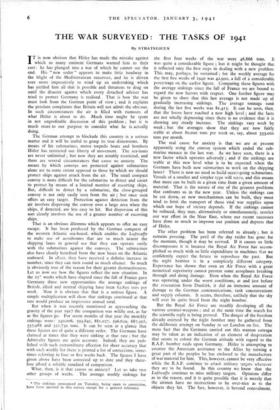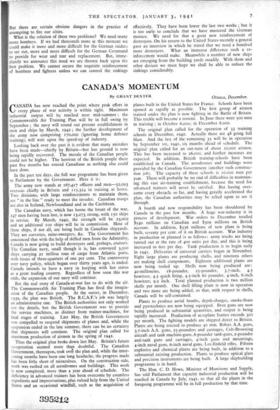THE WAR SURVEYED : THE TASKS OF 1941
By STRATEGICUS
IT is now obvious that Hitler has made the mistake against which so many eminent Germans warned him to their cost: he has plunged into a war of which he cannot see the end. His " new order " appears to make little headway in the blight of the Mediterranean successes, and he is driven ever more imperatively to wind up an undertaking which has yielded him all that is possible and threatens to drag on until the disaster against which every detached adviser has tried to protect Germany is realised. That is how the war must look from the German point of view ; and it explains the petulant complaints that Britain will not admit the obvious. In such circumstances the air is filled with rumours of what Hitler is about to do. Much time might be spent in not unprofitable discussion of this problem ; but it is much more to our purpose to consider what he is actually doing.
The German attempt to blockade this country is a serious matter and it will be useful to grasp its true dimensions. By means of his submarines, motor torpedo boats and bombers Hitler has restricted our liberty of movement. The sea-lanes are never unlimited ; but now they are notably restricted, and there are several circumstances that cause us anxiety. The means by 'Which convoys are protected against submarines alone are to some extent opposed to those by which we should protect ships against attack from the air. The small compact convoy is more difficult for the submarine to detect and easier to protect by means of a limited number of escorting ships. But, difficult to detect by a submarine, the close-grouped convoy is not only easily seen from the air ; but once seen offers an easy target. Protection against detection from the air involves dispersing the convoy over a large area when the ships, if detected, are less easy to hit. But dispersion of this sort clearly involves the use of a greater number of escorting ships.
That is an obvious dilemma which appears to offer no easy escape. It has been produced by the German conquest of the western Atlantic sea-board, which enables the Luftwaffe to make use of aerodromes that are so much nearer the shipping lanes in general use that they can operate easily with the submarines against the convoys. The submarines also have clearly benefited from the new bases on the Atlantic seaboard. In effect, they have received a definite increase in number, since they can turn round so much oftener. So much is obviously true of the reason for their greater destructiveness. Let us now see how the figures reflect the new situation. In the 25 * weeks which have elapsed since the fall of France gave Germany these new opportunities the average sinkings of British, allied and neutral shipping have been 82,895 tons per week. Now it is obvious that that is a serious figure. A simple multiplication will show that sinkings continued at that rate would produce an impressive annual total.
But when it was recently mentioned as approaching the gravity of the year 1917 the comparison was wildly out, as far as the figures go. For seven months of that year the monthly sinkings were: 540,006, 593,841, 881,027, 596,629, 687,507, 557,988 and 551,730 tons. It can be seen at a glance that these figures are of quite a different order. The Germans have claimed at times that they were sinking at that rate ; but the Admiralty figures are quite accurate. Indeed, they are pub- lished with such extraordinary affection for sheer accuracy that with each weekly list there is printed a list of corrections, some- times referring to four or five weeks back. The figures I have given above have been corrected up to date and they there- fore afford a reliable standard of comparison.
What, then, is it that causes us anxiety? Let us take two other groups of weeks. The average weekly sinkings for
* The sinkings announced on Tuesday, being open to correction, have been ignored in this survey except for a general reference.
the first four weeks of the war were 46,866 tons. It was quite a considerable figure ; but it might be thought that it reflected only the first steps in dealing with a new problem. This may, perhaps, be sustained ; for the weekly average for the first five weeks of 1940 was 42,99o, a fall of a considerable percentage or. the earlier figure. Comparing these figures with the average sinkings since the fall of France we are bound to regard the new factors with respect. One further figure may be given to show that this last average is not made up of gradually increasing sinkings. The average tonnage sunk during the last five weeks was 81,415. It can be seen, then, that the losses have reached a new high level ; and the facts are not wholly depressing since there is no evidence that it is showing any steady increase. The sinkings vary week by week ; but the averages show that they are now fairly stable at about 80,000 tons per week or, say, about 333,000 tons per month.
The real cause for anxiety is that we are at present apparently using the convoy system which ended the sub- marine menace in the last war. As we have seen, there is a new factor which operates adversely ; and if the sinkings are stable at this new level what is to be expected when the Germans have built new submarines to work on the shipping lanes? There is now no need to build ocean-going submarines. Vessels of a smaller and simpler type will serve, and this means that more can be built in a given time from a given amount of material. That is the nature of one of the greatest problems that confronts us in the new year. Unless the sinkings can be cut down, or new merchantmen can be built, they must tend to limit the transport of those vital war supplies upon which our hope of victory depends. If the sinkings cannot be reduced, they may, alternatively or simultaneously, restrict our war effort in the Near East, where our recent successes have done so much to improve our position and depress that of Hitler.
The other problem has been referred to already ; but it remains pressing. The peril of the day raider has gone for the moment, though it may be revived. If it causes us little discomposure it is because the Royal Air Force has accom- plished so much with so little expenditure in machines that we confidently expect the future to reproduce the past. But the night bomber is in a completely different category. Experience has shown that even an Air Force with a great numerical superiority cannot prevent some aeroplanes breaking through and doing damage. Even when the Royal Air Force was operating under the worst conditions, at and just before the evacuation from Dunkirk, it did an immense amount of damage to the German communications, tank concentrations and supply columns. It seems, therefore, unlikely that the sky will ever be quite freed from the night bomber.
But the Royal Air Force are steadily developing all the various counter-weapons ; and at the same time the search for the scientific reply is being pressed. The danger of the freedom already enjoyed by the night bomber may be gathered from the deliberate attempt on Sunday to set London on fire. The mere fact that the Germans carried out this wanton outrage may be taken as an indication of an element of desperation that seems to colour the German attitude with regard to the R.A.F. bomber raids upon Germany. Hitler is attempting to counter the American assistance to the Allies by turning a great part of the peoples he has enslaved to the manufacture of war material for him. This, however, cannot be very effective while the R.A.F. continue to attack military targets wherever they are to be found. In this country we know that the Luftwaffe continue to miss military targets. Opinions differ as to the reason, and it is quite possible that it is merely that the airmen have no instructions to be over-nice as to the objects they hit. The fact, however, is beyond concealment. But there are certain obvious attempting to fire our cities.
What is the solution of these two problems? We need many more bombers. If we had thousands more at this moment we could make it more and more difficult for the German raiders to set out, more and more difficult for the German Command to provide for wear and tear and replacement. But, imme- diately we announce this need we are thrown back upon the first problem. We cannot secure the requisite reinforcement of bombers and fighters unless we can control the sinkings dangers in the practice of effectively. They have been lower the last two weeks ; but it is too early to conclude that we have mastered the German menace. We need for that a great new reinforcement of destroyers. On his return to the United States recently a general gave an interview in which he stated that we need a hundred more destroyers. What an immense difference such a re- inforcement would make. Meanwhile a number of new ships are emerging from the building yards steadily. With them and other devices we must hope we shall be able to reduce the sinkings considerably.































 Previous page
Previous page